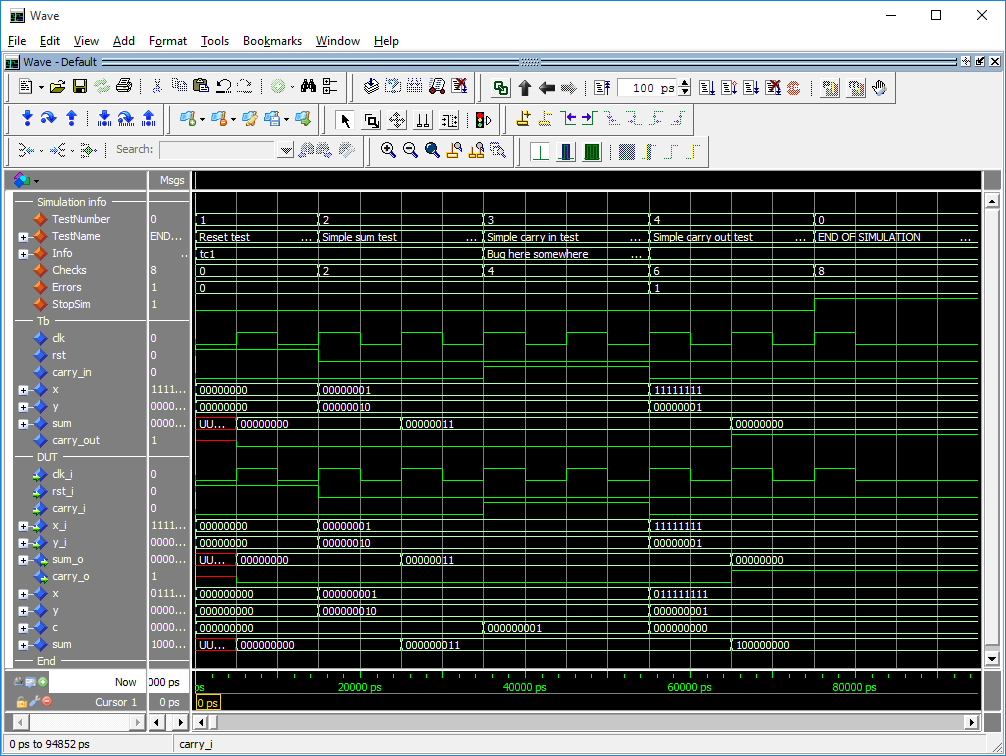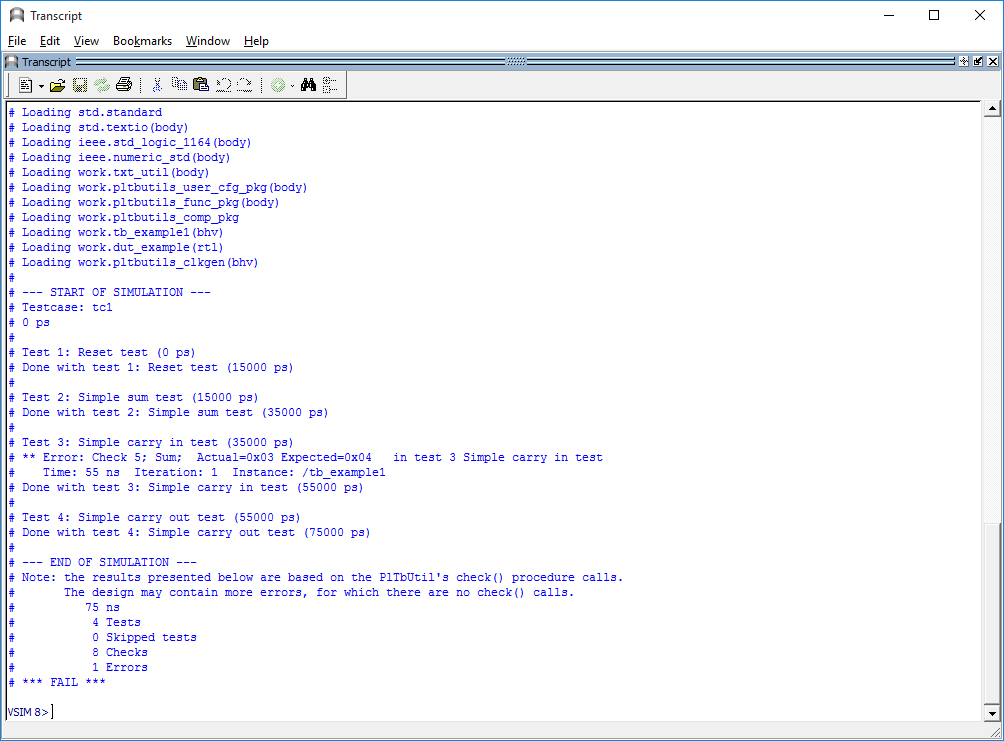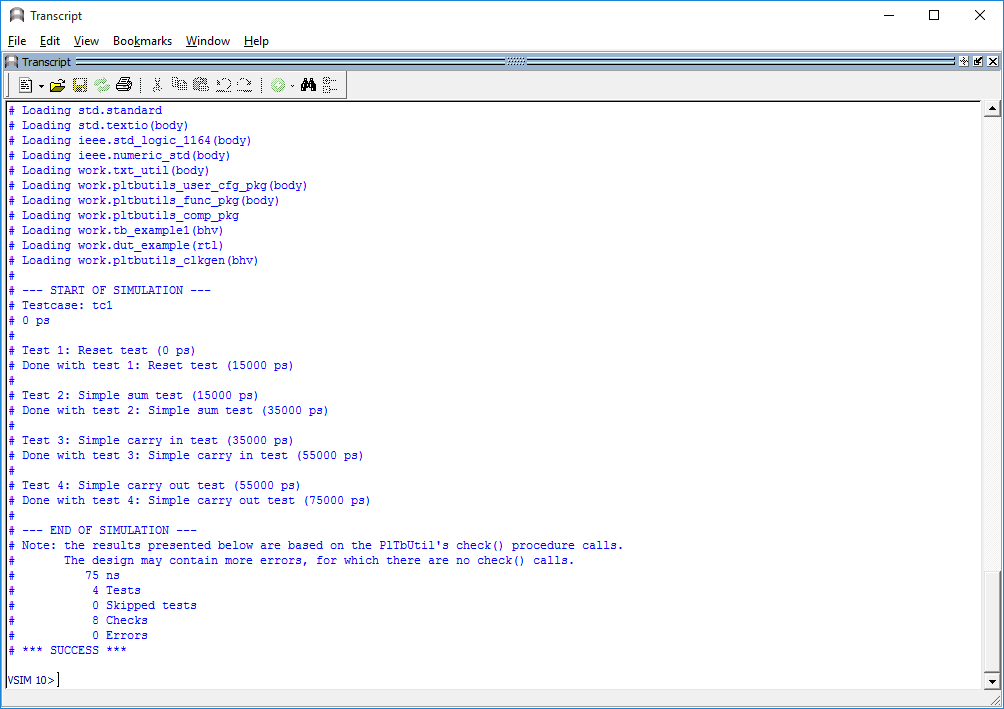 PlTbUtils
PlTbUtils
Project maintainers
Details
Created: Apr 14, 2013
Updated: May 12, 2020
SVN Updated: May 12, 2020
SVN: Browse
Latest version: download (might take a bit to start...)
Statistics: View
Bugs: 0 reported / 0 solved
Other project properties
Language:VHDL
Development status:Stable
Additional info:Design done, Specification done
WishBone compliant: No
WishBone version: n/a
License: LGPL
Description
PlTbUtils makes it easy to create automatic, self-checking simulation testbenches, and to locate bugs during a simulation. It is a collection of functions, procedures and testbench components that simplifies creation of stimuli and checking results of a device under test.
Features:
- Simulation status printed in transcript windows as well as in waveform window (error count, checks count, number and name of current test, etc).
- Check procedures which output meaningful information when a check fails.
- Clear SUCCESS/FAIL message at end of simulation.
- Easy to locate point in time of bugs, by studying increments of the error counter in the waveform window.
- User-defined information messages in the waveform window about what is currently going on.
- Transcript outputs prepared for parsing by scripts, e.g. in regression tests.
- Configurable status messages for use in continuous integration environments, e.g. TeamCity.
- Reduces amount of code in tests, which makes them faster to write and easier to read.
- Tests can easily be included or skipped in a test run.
- Supports VHDL-93 and later.
- Supports most popular VHDL simulators, including ModelSim, ISE ISim and Vivado XSim.
It is intended that PlTbUtils will constantly expand by adding more and more functions, procedures and testbench components. Comments, feedback and suggestions are welcome to pela.opencores@gmail.com .
Project web page: http://opencores.org/project,pltbutils
Subversion repository URL: http://opencores.org/ocsvn/pltbutils/pltbutils/trunk
Subversion export command:
svn export http://opencores.org/ocsvn/pltbutils/pltbutils/trunk pltbutils
See the PlTbUtils Specification.
A quick look
During a simulation, the waveform window shows current test number, test name, user-defined info, accumulated number of checks and errors. When the error counter increments, a bug has been found in that point in time.
The transcript window clearly shows points in time where the simulation starts, ends, and where errors are detected. The simulation stops with a clear SUCCESS/FAIL message, specifically formatted for parsing by scripts.
The testcase code is compact and to the point, which results in less code to write, and makes the code easier to read, as in the following example.
library ieee;
use ieee.std_logic_1164.all;
use ieee.numeric_std.all;
use work.txt_util.all;
use work.pltbutils_func_pkg.all;
-- NOTE: The purpose of the following code is to demonstrate some of the
-- features of PlTbUtils, not to do a thorough verification.
architecture tc1 of tc_example2 is
begin
p_tc1 : process
variable pltbv : pltbv_t := C_PLTBV_INIT;
begin
startsim("tc1", "", pltbv, pltbs);
rst <= '1';
carry_in <= '0';
x <= (others => '0');
y <= (others => '0');
starttest(1, "Reset test", pltbv, pltbs);
waitclks(2, clk, pltbv, pltbs);
check("Sum during reset", sum, 0, pltbv, pltbs);
check("Carry out during reset", carry_out, '0', pltbv, pltbs);
rst <= '0';
endtest(pltbv, pltbs);
starttest(2, "Simple sum test", pltbv, pltbs);
carry_in <= '0';
x <= std_logic_vector(to_unsigned(1, x'length));
y <= std_logic_vector(to_unsigned(2, x'length));
waitclks(2, clk, pltbv, pltbs);
check("Sum", sum, 3, pltbv, pltbs);
check("Carry out", carry_out, '0', pltbv, pltbs);
endtest(pltbv, pltbs);
starttest(3, "Simple carry in test", pltbv, pltbs);
print(G_DISABLE_BUGS=0, pltbv, pltbs, "Bug here somewhere");
carry_in <= '1';
x <= std_logic_vector(to_unsigned(1, x'length));
y <= std_logic_vector(to_unsigned(2, x'length));
waitclks(2, clk, pltbv, pltbs);
check("Sum", sum, 4, pltbv, pltbs);
check("Carry out", carry_out, '0', pltbv, pltbs);
print(G_DISABLE_BUGS=0, pltbv, pltbs, "");
endtest(pltbv, pltbs);
starttest(4, "Simple carry out test", pltbv, pltbs);
carry_in <= '0';
x <= std_logic_vector(to_unsigned(2**G_WIDTH-1, x'length));
y <= std_logic_vector(to_unsigned(1, x'length));
waitclks(2, clk, pltbv, pltbs);
check("Sum", sum, 0, pltbv, pltbs);
check("Carry out", carry_out, '1', pltbv, pltbs);
endtest(pltbv, pltbs);
endsim(pltbv, pltbs, true);
wait;
end process p_tc1;
end architecture tc1;



